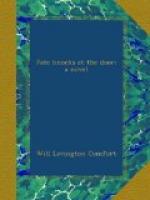Whistler, the master, had entered the class-room unannounced, where Beth was studying, as a girl in Paris. Glancing about the walls, his eyes fastened upon a sketch of hers. He asked the teacher for the pupil who did it, and uplifted Beth’s face to his, touching her chin and forehead lightly.
Then he whistled and said: “Off hand, I should say that you are to become an artist; but now that I look closely into your face, I am afraid you will become a woman.”
Tentatively, she was an artist; she would not grant more.... A little while before, she had been very close to becoming a woman. None but the Shadowy Sister knew how near. (The Shadowy Sister was an institution of Beth’s—her conscience, her spirit, her higher self, or all three in one. She came from an old fairy-book. A little girl had longed for a playmate, even as Beth, and one day beside a fountain appeared a Shadowy Sister. She could stay a while, for she loved the little girl, but confessed it was much happier where she lived.)... Shadowy Sisters for little girls who have no playmates, and for women who have no confidantes.
Under Beth’s mirth, during the recent talk with David Cairns, had been much of verity. She was carrying an unhealed wound, which neither he nor the world understood. In Andrew Bedient she had discerned a fine and deeply-endowed nature—glimpses—as if he were some great woman’s gift to the world, her soul and all. But Beth’s romantic nature had been desolated so short a time ago, that she despised even her willingness to put forth faith again.... Such fruit must perish on the vine, if only common hands attend the harvest.
Women like Beth Truba learn in bitterness to protect themselves from possibilities of disillusionment. They hate their hardness, yet hardness is better than rebuilding sanctuaries that have been brutally stormed. For one must build of faith, radium-rare to those who have lost their intrinsic supply.
The Other Man had been a find of Beth’s. He had come to her mother’s house years ago—a boy. He had seemed quick to learn the ways of real people, and the things a man must know to delight a woman’s understanding. In so many ways, the finishing touches of manhood were put upon him gracefully, that Beth gloried in the work of adding treasures of mind and character. She had even made his place in the world, through strong friends of her own winning.
Beth was a year or two older. The boy had grown splendid in appearance, when she discovered she was giving him much that he must hold sacredly, or inflict havoc upon the giver.... In moments when she was happiest, there would come a thought that something would happen.... The young man did not fully understand what caused the break. This may be the key to the very limitation which made him impossible—this lack of delicacy of perception. Certainly he did not know the greatness of Beth’s giving, nor the fineness she had come to expect from him.... She did not exactly love him less, but rather as a mother than a maid, since she had to forgive.




